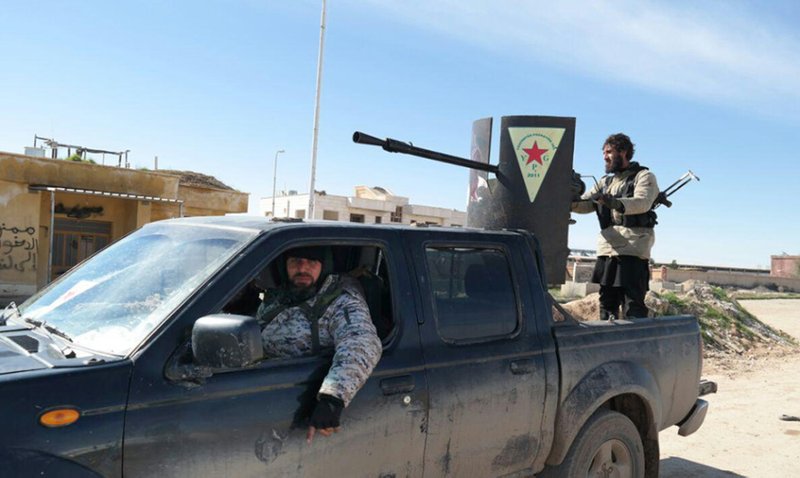BEIRUT -- Islamic State militants moved a large group of Christians they abducted to one of their strongholds as fighting raged Wednesday between the extremists and Kurdish and Christian militiamen for control of a chain of villages along a river in northeastern Syria, activists and state-run media said.
The Khabur River in Hassakeh province, which borders Turkey and Iraq, has become the latest battleground in the fight against the Islamic State. The area is predominantly Kurdish but also has populations of Arabs, Christian Assyrians and Armenians.
The Islamic State on Monday attacked communities nestled along the river, seizing at least 70 people, including many women and children. Thousands of others fled to safer areas.
The fate of those kidnapped, almost all of them Assyrian Christians, remained unclear Wednesday, two days after they were seized. Relatives searched frantically for word on the fate of their loved ones, but none came.
"It's a tragedy ... It is true what they say: History repeats itself," said Younan Talia, a high-ranking official with the Assyrian Democratic Organization.
He was referring to the 1933 massacre by Iraqi government forces of Assyrians in Simele, a town in northern Iraq, after which the community fled to the Khabur region, and massacres against Armenian and Assyrian Christians under the Ottoman empire.
The state-run Syrian Arab News Agency and the Assyrian Network for Human Rights in Syria said the hostages had been moved to the Islamic State-controlled city of Shaddadeh, south of the city of Hassakeh.
The United States and a coalition of regional partners are conducting a campaign of airstrikes against the Islamic State and have on occasion struck Shaddadeh, a predominantly Arab town.
"In addition to its strategy of terrifying people, taking hostages to use as human shields to protect from coalition airstrikes is another of its goals," said Osama Edward, director of the Stockholm-based Assyrian Network for Human Rights in Syria.
The mass abduction added to fears among religious minority groups in Syria and Iraq. During the Islamic State's bloody campaign in both countries, where it has declared a self-styled state ruled by Islamic law, minority groups have been repeatedly targeted and killed, driven from their homes, and seen their women enslaved and places of worship destroyed.
The Assyrians are indigenous Christian people who trace their roots back to the ancient Mesopotamians.
Talia said militants raided 33 Assyrian villages Monday, picking up as many as 300 people along the way. Many were plucked from their beds at dawn. A man who refused to leave his home was set on fire along with his house.
Talia added that more than 700 families who fled the Khabur region had arrived in Hassakeh, while 200 other families fled to Qamishli.
SANA reported Wednesday that about 90 civilians had been kidnapped by the extremists. It said the militants burned people's homes and stole their properties, adding that those kidnapped were taken to Shaddadeh.
It quoted the patriarch of the Greek Catholic church, Gregory III Laham, as saying that in addition to the abductions, the militants destroyed the historic church in Tal Hurmiz, one of the oldest in Syria. Edward said another church had been destroyed in Qaber Shamiyeh.
The Britain-based Syrian Observatory for Human Rights and a Christian group called the Syriac Military Council said heavy clashes against militants in the area were continuing. The group, which is fighting alongside Kurds and Arab militiamen, said three of its fighters were killed Tuesday in Tal Hurmiz.
Elsewhere on Wednesday, the U.S. Embassy in Jordan warned of a potential threat of attacks against "high-end malls" in Jordan's capital, as the kingdom takes part in the airstrikes targeting the extremists.
The embassy said the threat to Amman shopping malls was "judged to be credible" but that it had no information about the type or timing of any possible attack. It advised U.S. citizens to stay away from the malls.
Government spokesman Mohammed al-Momani said Jordan had stepped up security measures in the country after "regional events intensified."
Jordan earlier this month raised its profile in the military campaign against the Islamic State after the extremists released a video that showed them burning to death a Jordanian fighter pilot.
Jordan's King Abdullah II arrived Wednesday in Saudi Arabia for a meeting with newly enthroned King Salman. Saudi Arabia also is a part of the coalition fighting the Islamic State.
A Saudi official, who spoke on condition of anonymity because he was not authorized to release the information, said the meeting would focus on efforts to fight the Islamic State, the ongoing Israeli occupation of Palestinian land and turmoil in Yemen.
Information for this article was contributed by Bram Janssen, Abdullah Al-Shihri and staff members of The Associated Press.
A Section on 02/26/2015

